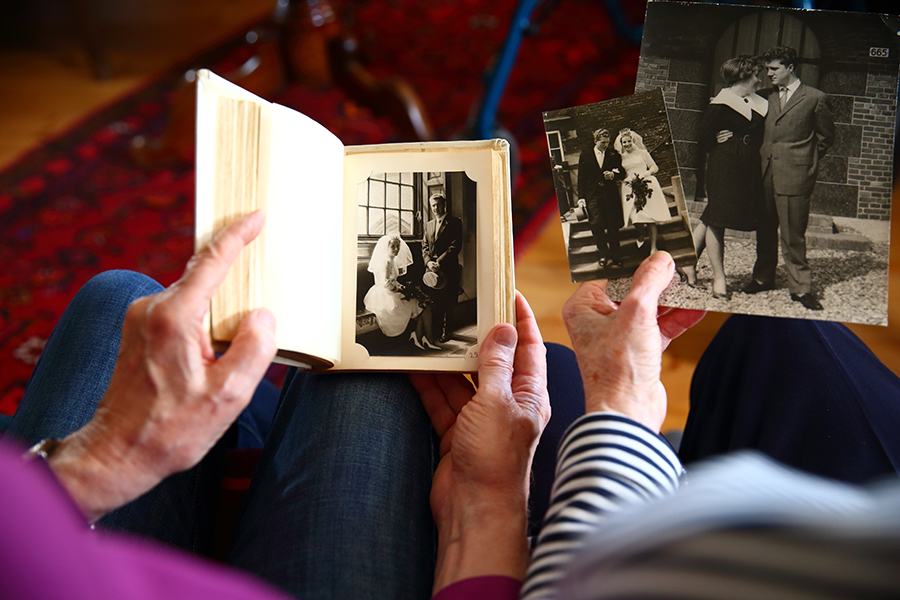A guide to having meaningful conversations with those with dementia
Dementia, a neurological condition that affects memory, cognition, and communication abilities, presents unique challenges in everyday interactions.
We explore strategies and techniques to help you engage in meaningful conversations with someone who has dementia, ultimately enhancing their quality of life.
Understanding Dementia
Before delving into effective communication strategies, it is important to gain a basic understanding of dementia. Dementia is an umbrella term used to describe a range of progressive neurological disorders that affect cognitive functions such as memory, language, and problem-solving. The most common types of dementia include Alzheimer’s disease, vascular dementia, and Lewy body dementia. Individuals with dementia often experience difficulties in finding the right words, comprehending complex information, and following conversations, making communication challenging for both parties involved.
Read more:
- Dementia prevention 6-week online course
- How music classes and choirs benefit those with dementia
- How best to support a loved one with dementia
Creating a Supportive Environment
To facilitate effective communication, it is crucial to create a supportive environment that minimises distractions and enhances the person’s focus. Remove any background noise or visual clutter that may divert their attention away from the conversation. Choose a quiet and well-lit space that promotes a sense of calmness. Additionally, incorporating visual aids and cues can provide valuable support. For example, using photographs, written prompts, or familiar objects can help jog their memory and facilitate comprehension.
Effective Verbal Communication Techniques
When engaging in conversation with someone who has dementia, employing certain verbal communication techniques can greatly improve understanding and engagement. First and foremost, speak clearly and slowly, allowing the person to process your words at their own pace.
Using simple language and short sentences is also crucial, as complex information may overwhelm or confuse them. Asking open-ended questions that require more than a simple “yes” or “no” answer encourages the person to share their thoughts and feelings.
Non-Verbal Communication Strategies
Non-verbal communication, such as body language and facial expressions, can convey emotions and intentions effectively. Maintain a warm and friendly facial expression, making eye contact to establish a connection. Use gentle touch when appropriate, as it can provide comfort and reassurance. Displaying empathy and active listening skills by nodding, smiling, and mirroring their body language can help create a sense of trust and understanding.
Adapting Communication Styles
Each person with dementia is unique, and their communication preferences may vary. Pay attention to their verbal and non-verbal cues to adapt your communication style accordingly. Some individuals may prefer more formal language, while others respond better to informal and familiar terms. Utilising reminiscence therapy, which involves discussing past experiences and cherished memories, can be a powerful way to stimulate conversation and trigger positive emotions.
Here are three examples of conversation starters that can be used when engaging with someone who has dementia:
1. Talk about a favorite memory from your childhood, and encourage them to share a memory from theirs. Asking an open-ended question encourages the person to reminisce and share positive experiences from their past. It allows them to engage in storytelling and express their emotions, giving a sense of connection and promoting cognitive stimulation.
2. Tell them what you enjoyed doing for fun when you were younger and ask what they enjoyed to do for fun. This question taps into the person’s personal interests and hobbies. It encourages them to recall activities they used to enjoy, such as playing a musical instrument, gardening, or participating in sports. By discussing their past passions, it can spark enthusiasm and provide an opportunity for meaningful conversation.
3. Share your memory of a special place you’ve visited in your lifetime and encourage them to share theirs. This question invites the person to reflect on their travel experiences and favorite destinations. It allows them to share anecdotes, describe landscapes, and evoke memories associated with those places. It can lead to engaging discussions about different cultures, historical events, or simply joyful moments spent exploring new surroundings.
By starting off the conversation by sharing your own experiences, it helps to prevent any potential awkwardness that could arise from directly asking a question if they are unable to remember.
It’s important to listen attentively, respond with empathy, and provide encouragement. Building a supportive and engaging environment will help people with dementia feel valued and understood during conversations.
Tips for Successful Interactions
Patience is key when communicating with someone who has dementia. Allow them ample time to process information and respond, resisting the urge to rush or finish their sentences.
Be mindful of your own body language, remaining calm and composed even if the conversation becomes challenging.
Avoid using correction techniques, as correcting their statements may cause frustration and confusion. Instead, focus on validation by acknowledging their emotions and experiences, even if their recollections may be inaccurate.
Effective communication plays a vital role in enhancing the well-being and quality of life for people living with dementia.
By understanding the unique challenges they face and employing strategies to create a supportive environment, using effective verbal and non-verbal techniques, and adapting our communication styles, we can encourage meaningful connections and improve their overall experience.
Remember, patience, empathy, and active listening are essential ingredients in the recipe for successful communication with someone who has dementia.
Read more:
- Dementia Prevention Course: Your Roadmap to a Sharp Mind
- How music classes and choirs benefit those with dementia
- How best to support a loved one with dementia
Lisa Lawrenson
Latest posts by Lisa Lawrenson (see all)
- Masterclass: How to grow a thick healthy lawn - March 31, 2024
- Lawn care – dealing with moss and thatch - March 22, 2024
- A beginners guide to Artificial Intelligence and Chat GPT - February 29, 2024
- 10 minute tutorial: How to arrange supermarket lillies into a stunning floral arrangement - January 1, 2024
- 10 health changes women should watch out for after 50 - January 1, 2024






















